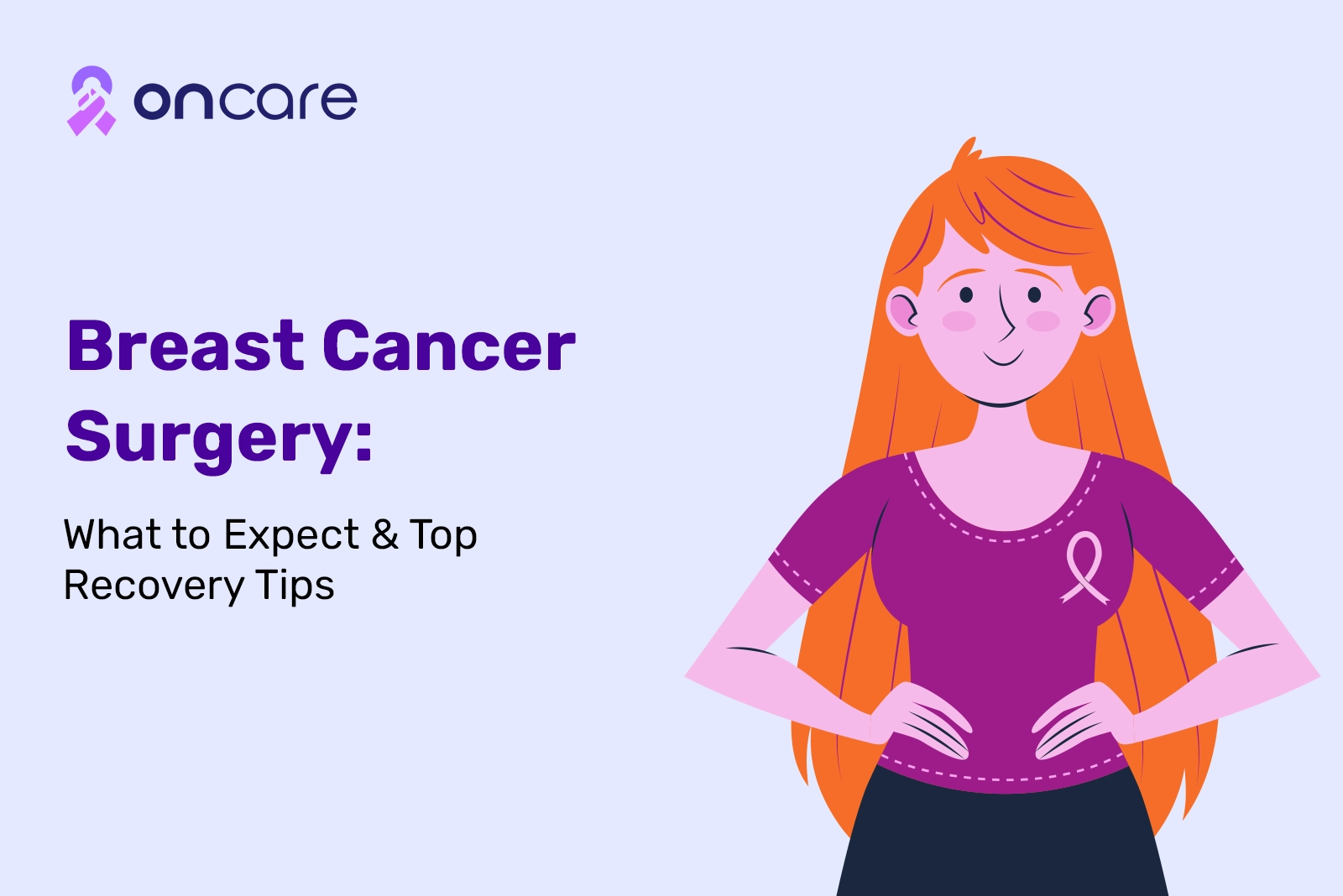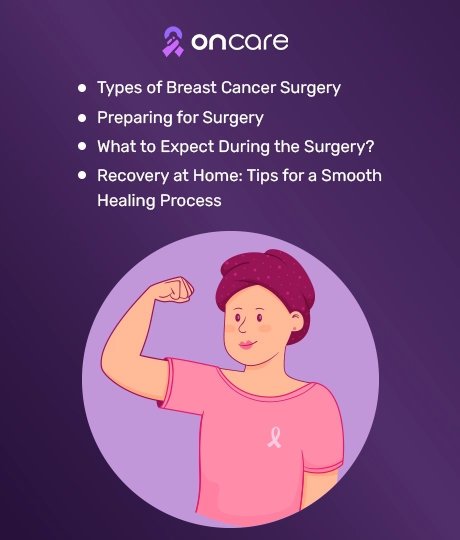Breast Cancer Surgery: What to Expect and Top Recovery Tips

Facing a breast cancer diagnosis can be overwhelming, but surgery is often a crucial step in the journey toward recovery. As part of breast tumor treatment, understanding what to expect can ease anxiety and empower you to take charge of your health. With the right preparation and support, you can navigate this phase with confidence and focus on healing. Treatments like radiation therapy for breast cancer may also follow surgery to ensure thorough care.
At Oncare, we combine advanced medical expertise with a patient-centered approach, ensuring that every individual receives the care and resources needed for a successful recovery from breast cancer.
Also Read : Breast Cancer: Symptoms, Diagnosis, and Treatment Options
Types of Breast Cancer Surgery
Surgery is a key step in treating breast cancer, designed to remove cancerous tissue and support recovery. Whether it’s a lumpectomy, mastectomy, or reconstructive surgery, we ensure each procedure is tailored to the patient’s specific needs for the best possible outcome.
Lumpectomy
A lumpectomy, often referred to as breast-conserving surgery, involves removing the cancerous tumor while preserving as much of the breast as possible. Our oncologists often recommend this procedure for early-stage cancers or smaller tumors where the surrounding healthy tissue can remain intact. After the surgery, patients often undergo radiation treatment for breast cancer to reduce the risk of recurrence. A lumpectomy is ideal for those who wish to maintain their breast shape and appearance with minimal impact on daily activities. Recovery is generally faster compared to more invasive procedures, making it a preferred choice for eligible patients.
Mastectomy
A mastectomy involves removing the entire breast and is often recommended for more advanced cancers or cases where multiple tumors are present. There are different types of mastectomy surgery offered at Oncare, including total mastectomy, skin-sparing mastectomy, and nipple-sparing mastectomy, each tailored to the patient’s needs. This procedure is often followed by therapy for breast cancer, such as chemotherapy or radiotherapy, to eliminate remaining cancer cells. While the recovery process can be longer, advances in surgical techniques have made mastectomies less invasive and more effective. For those concerned about aesthetics, reconstructive options are available to restore the breast’s appearance.
Reconstructive Surgery
Reconstructive Surgery is a restorative procedure aimed at rebuilding the breast’s shape after a mastectomy or, in some cases, a lumpectomy. It can be performed using implants or tissue from other parts of the body, depending on the patient’s preference and medical condition. This surgery plays a significant role in helping patients regain confidence and improve their quality of life after undergoing treatment for stage 3 breast cancer or other advanced stages. While it’s often elective, many patients find it an important step in their recovery journey. At Oncare, our team of oncologists works closely with patients to explore reconstructive options that align with their health goals and individual preferences, providing enhanced care throughout the process.
Also Read : Breast Cancer Management and Treatment

Preparing for Surgery
Proper preparation is essential for a smooth surgical experience and recovery. Whether it’s part of a breast tumor treatment plan, organizing your medical, emotional, and practical needs beforehand can make the process less stressful and more manageable. Here are the key areas to focus on for the best outcomes in your therapy for breast cancer journey.
Medical Preparations
Before surgery, your healthcare team will guide you through necessary medical steps to ensure you’re ready for the procedure. These may include:
- Pre-Surgery Tests: Blood tests, imaging scans, and EKGs to assess your overall health.
- Fasting Instructions: Avoiding food and drink for a specified period before surgery.
- Medication Guidelines: Adjusting current medications or starting new ones as advised.
- Health Conditions: Managing existing conditions like diabetes or hypertension for optimal outcomes.
Emotional Readiness
Preparing emotionally is just as important as preparing physically. Undergoing surgery can trigger anxiety, fear, or uncertainty, but there are ways to address these feelings:
- Educate Yourself: Understand the procedure and its benefits to ease fears.
- Communicate Openly: Share your concerns with your doctor and loved ones.
- Practice Relaxation Techniques: Deep breathing, meditation, or light exercises can help calm your mind.
- Seek Support: Joining a support group or speaking with a counselor can provide comfort and reassurance.
Practical Tips
Making practical arrangements ahead of surgery can significantly ease the recovery process:
- Create a Comfortable Recovery Space: Arrange pillows, blankets, and essential items within reach at home.
- Prepare Meals: Stock up on easy-to-prepare or pre-cooked meals.
- Arrange Transportation: Ensure someone is available to drive you to and from the hospital.
- Organize Help: Ask friends or family to assist with household chores or childcare
Also Read : What Are the Symptoms of Breast Cancer?
What to Expect During the Surgery?
Breast cancer surgery typically begins with preoperative preparation, followed by the administration of anesthesia to ensure you are comfortable and pain-free throughout the procedure. Depending on the type of surgery, general anesthesia is commonly used, rendering you unconscious. The duration of the surgery varies: a lumpectomy may take 1-2 hours, while a mastectomy or more complex procedures like reconstructive surgery may last 2-4 hours. The surgical team will closely monitor your vitals to ensure safety at every step.
Once the surgery is complete, you will be moved to a recovery room, where healthcare professionals will monitor your condition as the effects of anesthesia wear off. In cases where follow-up treatments, such as radiation therapy for breast cancer, are needed, your oncologist will discuss the plan post-surgery. Discharge may occur the same day for minor procedures, or you may need to stay overnight for more extensive surgeries. With a commitment to patient care, Oncare supports you throughout your recovery journey and helps you achieve the best outcomes.
Also Read : 10 Early Signs of Breast Cancer Every Woman Should Know
Recovery at Home: Tips for a Smooth Healing Process
Recovering from breast cancer surgery involves careful attention to your body and following your doctor’s recommendations. Here are some essential tips to help you heal effectively during your breast tumor treatment:
Managing the Surgical Site
Proper wound care is crucial for preventing complications and ensuring a smooth recovery.
- Follow your oncologist's instructions for cleaning and dressing the wound.
- Watch for signs of infection, such as redness, swelling, or fever.
- Handle surgical drains with care and report any unusual changes.
- Use prescribed or over-the-counter pain medication as directed.
Physical Activity and Mobility
Gentle movements can aid recovery and prevent stiffness without overexerting the body.
- Start with light exercises, like gentle arm stretches, to avoid stiffness.
- Take short walks to improve circulation and promote recovery.
- Avoid lifting heavy objects or engaging in strenuous activities.
Diet and Lifestyle
A healthy diet and comfortable clothing can support both physical and emotional healing.
- Stay hydrated and eat a nutrient-rich diet to support healing.
- Include foods high in vitamins and protein to boost recovery.
- Wear loose, comfortable clothing and a supportive bra for added comfort.
Additional Tips for Breast Cancer Patients Undergoing Radiation
Preparing for radiation therapy can minimize discomfort and support the healing process.
- If follow-up radiation therapy for breast cancer is required, prepare for potential skin sensitivity.
- Keep the area moisturized and avoid harsh soaps or tight clothing.
Also Read : Understanding Lumpectomy: A Comprehensive Guide to Breast Cancer Surgery
Conclusion
Recovering from breast cancer surgery is a journey that requires patience, proper care, and emotional support. Whether you’re undergoing mastectomy surgery or preparing for follow-up treatments like radiation therapy for breast cancer, staying informed and proactive can make a significant difference in your healing process.
With the right support and expert care, you can navigate this challenging phase and focus on rebuilding your health. At Oncare, we are dedicated to offering enhanced guidance and expert assistance to help you achieve the best possible recovery outcomes.
Frequently Asked Questions (FAQs)
Recovery time varies depending on the type of surgery. Lumpectomy patients typically recover in 1-2 weeks, while mastectomy recovery may take 4-6 weeks or longer. Factors like follow-up treatments, such as radiation therapy for breast cancer, can also impact recovery duration.
To recover quickly, follow your oncologist's advice on wound care, rest, and light exercise. Eating a healthy diet, staying hydrated, and gradually increasing physical activity can speed up healing. Avoid lifting heavy objects or strenuous activities during the initial weeks.
Yes, many people live long, healthy lives after breast cancer, especially if detected and treated early. Advances in breast carcinoma treatment and follow-up care have significantly improved survival rates.
Focusing on proper wound care, maintaining a balanced diet, and adhering to a light exercise regimen can promote faster recovery. Emotional support and following medical advice play key roles in the healing process.
Follow wound care instructions, eat nutritious meals, and engage in light physical activity. Avoid heavy lifting, smoking, or consuming alcohol, as they may hinder recovery.
Adequate rest, a protein-rich diet, staying hydrated, and gentle exercises can speed up recovery. Discuss your recovery plan with your doctor, especially if additional treatments like breast radiation are involved.
Certain cancers, like early-stage skin cancer, thyroid cancer, and testicular cancer, are highly treatable and often curable if detected early. Breast cancer caught in its early stages also has high survival rates.
Yes, many individuals fully recover, particularly with early detection and comprehensive treatment. Long-term follow-up care is essential to monitor and maintain overall health.
Avoid processed foods, high-sugar snacks, and alcohol, as these may delay healing. Focus on fresh fruits, vegetables, lean protein, and whole grains to support recovery.
Gentle exercises like stretching, walking, and light yoga are beneficial during recovery. Gradually increase intensity with your doctor's approval, especially after mastectomy surgery or radiation.
Surround yourself with supportive friends and family, join a cancer survivor group, and focus on self-care activities. Setting small, achievable goals can help maintain a positive outlook during recovery.